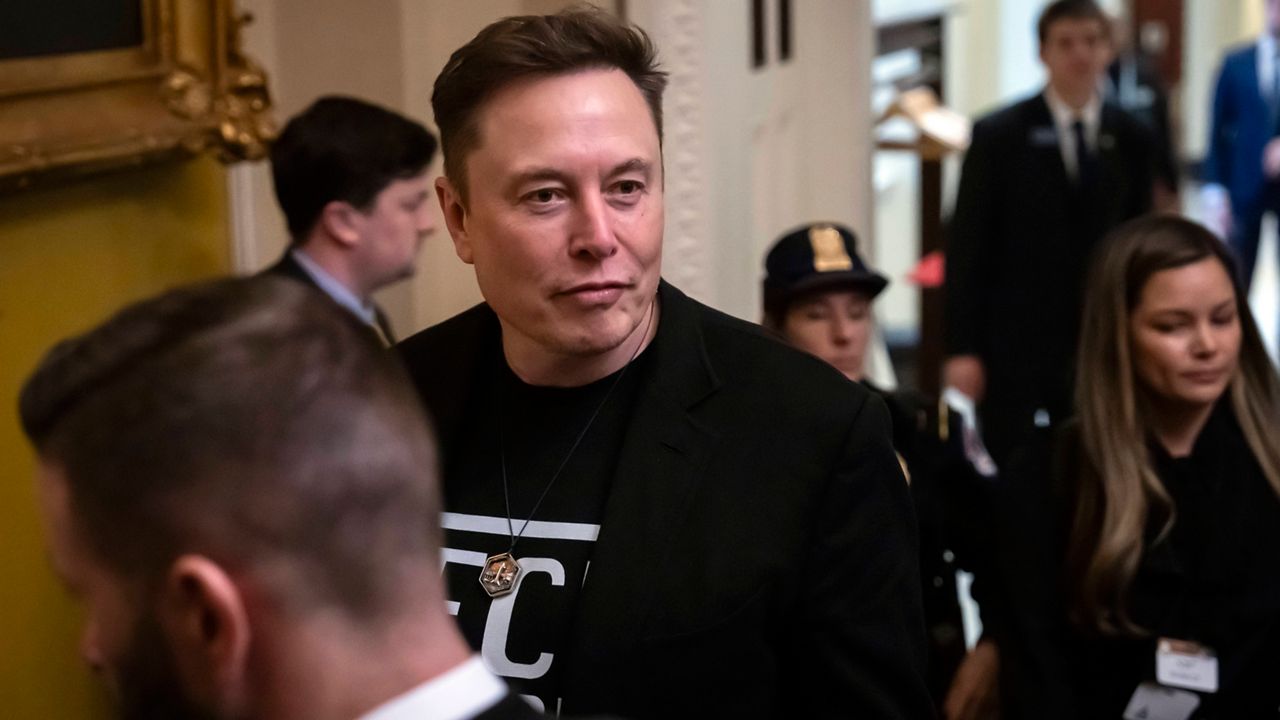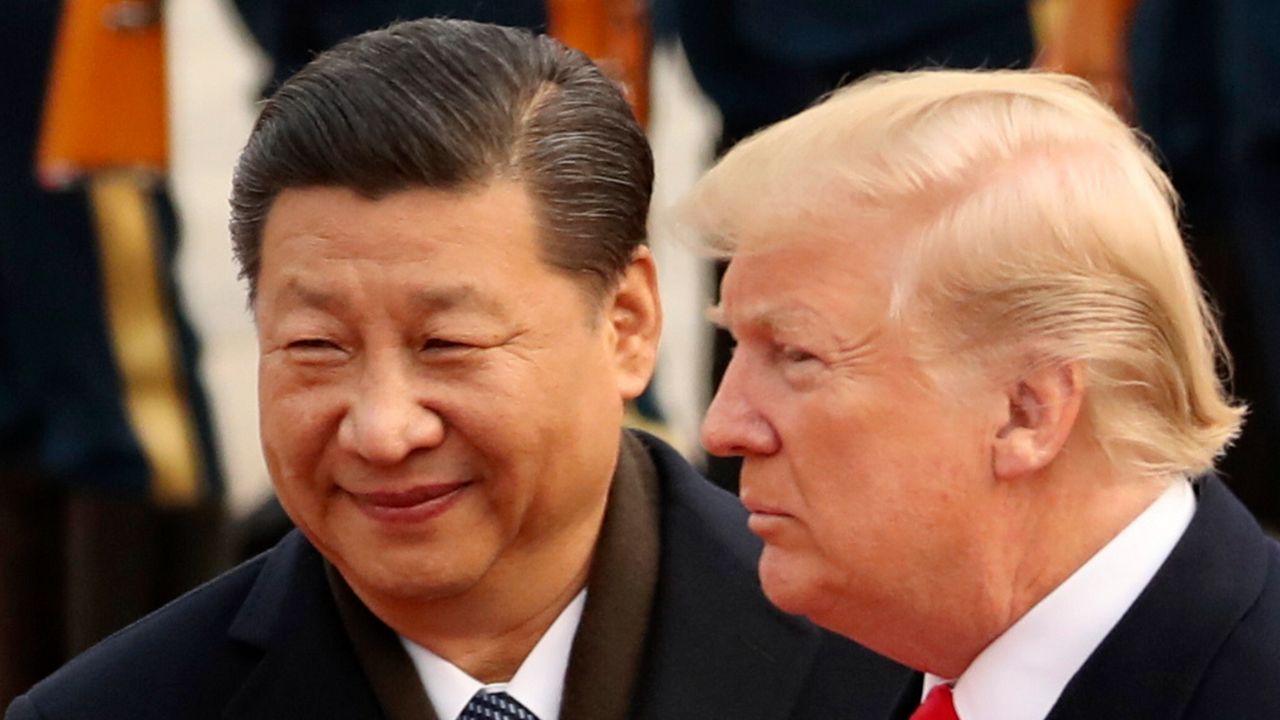President Joe Biden on Tuesday announced significantly higher new tariffs on Chinese electric vehicles, solar panels, batteries, certain steel and aluminum exports, port cranes and other technologies as the U.S. aims to protect its domestic green energy industries.
Joined by union leaders, lawmakers and other guests in the White House's Rose Garden, Biden sought to make the case that these new tariffs will protect American workers.
"American workers can outwork and out-compete anyone, as long as the competition is fair," Biden said. "And for too long, it hasn't been fair."
Tariffs on Chinese electric vehicles will quadruple from a 25% tax on imports to 100% and on solar cells and semiconductors from 25% to 50%, according to the White House. Some tariffs will kick in this year, while others will come online over the next two years — in part, a senior administration official said, to give domestic industry time to catch up with demand for items like batteries.
"China heavily subsidized all these products," the president said said. "Chinese companies produced far more than the rest of the world can absorb, dumping the excess products onto the market at unfairly low prices, driving other manufacturers around the world out of business."
The goal, National Economic Council director Lael Brainard said on a press call on Monday afternoon, is to prevent investments made through domestic spending legislation championed by President Joe Biden from being “undercut by a flood of unfairly underpriced exports from China in areas like EVs batteries, vital medical equipment steel and aluminum semiconductors and solar.”
“China's using the same playbook it has before to power its own growth at the expense of others by continuing to invest — despite excess Chinese capacity — and flooding global markets with exports that are underpriced due to unfair practices,” Brainard said, naming intellectual property theft and forcing foreign companies to share technology with the Chinese government as examples of China’s “unfair practices.”
“These practices favor Chinese automakers at the expense of US and other foreign automakers and autoworkers and are leading to a massive surge of unfairly underpriced Chinese vehicles into foreign markets. The president won’t let that happen here,” Brainard added.
The president called his actions of "combining investments in America with tariffs that are strategic and targeted" a "smart approach."
The announcement could spark retaliation from China on U.S. products. China said Tuesday it strongly opposes the tariffs, accusing the U.S. of violating World Trade Organization rules and vowing to "take all necessary actions" in response.
"China opposes the unilateral imposition of tariffs which violate WTO rules and will take all necessary actions to protect its legitimate rights," Chinese foreign ministry spokesperson Wang Wenbin told reporters.
"Hopefully we won’t see a significant Chinese response, but that’s always a possibility," Treasury Secretary Janet Yellen said on Monday.
The new tariffs come in an election year for Biden as he tries to show American workers he will be tough on China, a stance that his rival former President Donald Trump frequently boasts he will take. Brainard specifically named “communities in Michigan and Pennsylvania,” two key swing states in November's election, as being harmed by China’s exports.
And she called out “the previous administration” for failing to properly protect American industry from Chinese exports, namedropping the failed Foxconn factory in another swing state: Wisconsin. Biden went to the site of the planned factory last week to tout a multibillion dollar Microsoft data center that is taking its place.
The president took aim at his presumptive opponent in November's election, saying that his economic policies, both domestic and on the international stage, "failed."
"My predecessor promised increased American exports and boosted manufacturing,” Biden said. “But he did neither. He failed.”
"He signed a trade deal with China, they were supposed to buy $200 billion more in American goods," he added. "Instead, China imports from America barely budged.
Biden also repeated a line he used in Wisconsin last week, another key battleground state, when touting a new Microsoft AI center on the site of a failed Foxconn facility backed by Trump.
"He said it would be the eighth wonder of the world," Biden said of Trump's comments at a ceremonial groundbreaking for the facility in 2018. "Big promises that never came true. He used that golden shovel to dig a hole and he fell into it."
Trump has floated the idea of levying massive tariffs against China in order to reduce the U.S. trade deficit if he returns to office. He has repeatedly claimed that Biden’s support for EVs would ultimately cause American factory jobs to go to China.
Biden touted his efforts to stand up to China, including backing Taiwan, revitalizing partnerships with Indo-Pacific allies like Australia and Japan and ensuring American technologies can't be used by Beijing, while saying of Trump: "For all his tough talk on China, it never occurred to my predecessor to do any of that."
After his remarks, a reporter asked the president to respond to Trump's comments earlier in the day saying that China is "eating our lunch" from an economic standpoint. Biden quipped back: "He’s been feeding them for a long time."
A spokesperson for Trump's campaign on Tuesday called Biden's announcement a "weak and futile attempt to distract" from alleged harm caused by his electric vehicle policies.
Tuesday’s announcement keeps in place some tariffs that were imposed during Trump’s administration, covering about $360 billion in Chinese goods. New tariffs included in the announcement will cover an additional $18 billion.
China is the world’s second largest economy after the United States and a geopolitical foil for members of both the Democratic and Republican parties.
But, Brainard said, Biden is seeking a balance between “a stable bilateral relationship” and “responsibly managing competition” with China. When he floated hiking tariffs on Chinese steel and aluminum last month — hikes included in Tuesday’s announcement — Biden said “I’m not looking for a fight with China. I’m looking for competition — but fair competition.”
“Our goal is not to escalate tensions, and we expect that they have a full understanding of why we're taking these measures,” a senior administration official said on Monday. Another official said that the trade dispute “has been part of long-standing conversations with Chinese officials” and high-level Cabinet secretaries, including Yellen, Secretary of State Antony Blinken and Commerce Secretary Gina Raimondo.
“China is now simply too large for the rest of the world to absorb this enormous capacity. Actions taken by the PRC today can shift world prices,” Yellen said during a speech delivered in Beijing in April, using the acronym for China’s official name, the People’s Republic of China. “And when the global market is flooded by artificially cheap Chinese products, the viability of American and other foreign firms is put into question.”
There currently are very few EVs from China in the U.S., but officials worry that low-priced models could soon start flooding the U.S. market.
A car model launched last year by Chinese automaker BYD sells for around $12,000 in China. The car’s craftsmanship rivals U.S.-made EVs that cost three or four times as much — and is stoking fear in the U.S. industry.
The Alliance for American Manufacturing — an alliance of businesses and the U.S. Steelworkers union — released a report in February that says the introduction of inexpensive Chinese autos to the American market “could end up being an extinction-level event for the U.S. auto sector.” The U.S. auto sector accounts for 3% of America’s GDP, according to the report.
The Associated Press contributed to this report.









